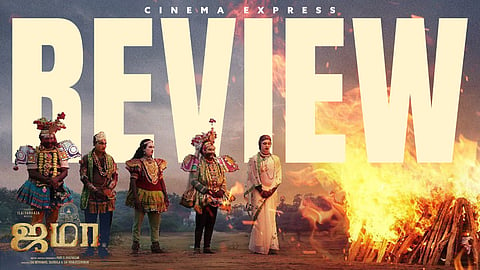Jama Movie Review: An efficient Pari Elavazhagan anchors a middling tale on street theatre
Jama(2.5 / 5)
Writer and educator Cesar A Cruz once said, “Art should comfort the disturbed and disturb the comfortable.” When Kalyanam (Pari Elavazhagan) participates in a ritual before changing into a costume for his first koothu, his family asks if he likes to play Arjuna or Karna from The Mahabharata. To this, he replies that he would love to play Draupadi. “Neenga idhe vesham podum bothu avlo azhaga irupeenga,” (When you wear the same costume, you look so beautiful) he mentions to his father Ilavarasu (Srikrisha Dayal). It is this moment that truly moves your heart, emphasising that the love for art can transcend all differences, defying traditional gender norms, if an actor truly wants to shine.
Director: Pari Elavazhagan
Cast: Pari Elavazhagan, Chetan, Ammu Abhirami, Srikrishna Dayal, KVN Manimegalai, Kaala Kumar, Vasanth Marimuthu and Siva Maran
Traditional art forms in Tamil Nadu have ingrained Tamil customs and folklore, and thereby present a rich ground for promising and uplifting stories straight from rural heartlands. Therukoothu is one such artform and its expressiveness is wonderfully conveyed in the first shot of Kalyanam wearing heavy makeup for a long night of street theatre. Pari Elavazhagan’s debut directorial is a wonderful ode to Therukoothu. And its authenticity is brought forth in every way possible—right from the songs, makeup, and props to the staging. However, even as they are seamlessly integrated into the screenplay, the narrative suffers from heavy exposition that overstays its welcome.
Although Jama is the story of how Kalyanam attempts to reclaim the therukoothu group (Jama) that was once snatched away from his father, there are other layers that explore why he wants it. And It isn’t all about the jama, it is also a deep meditative pursuit of respect and love. The film discusses Kalyanam's respect for his guru Tandavam (Chetan), equal treatment from peers who constantly insult him with taunts of ‘akka’ for his effeminate behaviour, and love from his mother who doesn’t understand his interests. There are constant jibes thrown at him, noting that ‘Kalyanam ku kalyanam agala’ types and how women feel safe around him. They barely work…until Jaga (Ammu Abhirami) walks into the screen.
She is fierce and does all that Kalyanam doesn’t. She stands her ground even when the whole world is against her choice of wanting to marry him. During a particular scene, she delivers a monologue on who, according to her, is a man. But the dialogues are generic and gender-neutral so it doesn’t stir any emotions. Kalyanam and Jaga’s romantic portions are heartwarming, and it is always lovely to see women taking the initiative to confess their love. However, their relationship heads nowhere and the audiences are left to wonder why the director failed to provide an appropriate closure for this arc.
Leaving aside romance, even the path that Kalyanam takes to form a new jama is not without its ample flaws. The characterisations of Kalyanam and Tandavam are painted with broad strokes, both of them are extremely different from each other. If it is naivety that Kalyanam projects throughout the runtime, Tandavam’s words strike arrows every time he opens his mouth. He has a heavy dose of Kalyanam’s tears for breakfast day after day despite knowing that it was intentionally done to satiate his vengeance that has accumulated over the years. So, when a natural transformation happens, it feels out of place and unconvincing.
Death is also used as a convenient plot device to move the story forward. It feels as though when the story loses momentum or steam, the makers decide that it is the right time for someone to die on screen so that it moves to the next chapter. Even during a poignant scene that leaves its heavy footprints everywhere in the village, the audience’s eyes were as dry as a desert. Only when a key character sheds a tear, do we release the intensity of it all—which unfortunately doesn’t transfer beyond the screen.
The flashback portions, which extend far beyond a certain duration and needless melodrama bog down this story that showed a ton of promise. All the world’s a stage, but this one needed better support to piece its props together to sing a better story.

